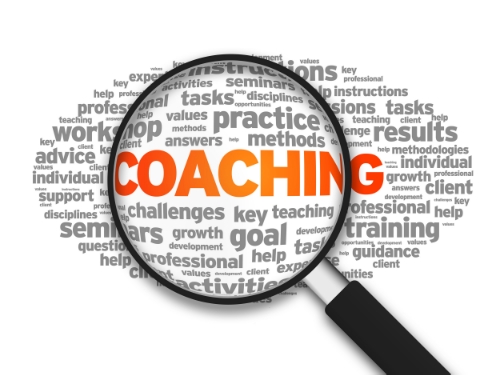What is a Professional Coach?
When you hear the term “Coach”, most people immediately think of a sports or athletic coach. While this is a type of coaching, it is considered directive coaching. This type of coaching focuses on telling the client what to do and how to do it through instruction or advice.
Non-directive coaching focuses on helping the client or employee solve his/her problem. Here, the answers always rely within the client. It is the coach’s job to help draw those answers out through a series of skills that ultimately raise their client’s awareness and accomplish what they want and help them get to where they want to be.
Coaching: Definitions and Differences
Coaching is a conversation that helps people think things through. Coaching can help you or your employee explore places they may have never gone before and it helps them make a plan and take action to accomplish those goals. The coach therefore serves as a catalyst, which is an important element in the process of accelerating change.
A Coach:
- Is a partner for a period of time to come alongside you to help you get to where you would like to go.
- Is focused on your growth and success
- Listens and believes in you, your value, and your potential in life (Believes in you before you believe in yourself)
- Is able to look at things differently
- Helps you discover your potential and helps you move forward with it
- Helps you see and feel your dreams and then helps you practically move toward them
A Coach Is Not
A person who focuses on addressing past issues or that gives you advice. A coach is not like a: teacher, trainer, facilitator, counselor, therapist, consultant, advisor, mentor, or good friend.
Coaching is not about solving problems, although problems will be solved. Coaching is primarily about discovery, awareness, and choices. It is a way of effectively empowering people to find their own answers, encouraging and supporting them on the path as they continue to make important life giving and life changing choices.
Coaching is a process and a partnership that helps the client or employee discover and build his or her own competency in recognizing and solving problems.
| Coach | Deals with present and focuses the client on moving toward success and a desirable future through being curious, asking great questions, and drawing from within the client. |
| Counselor | Deals with the past and seeks healing through questions. |
| Consultant | Deals with problems and seeks to provide information, expertise, advice, strategies, and methodologies to solve them. |
| Good Friend | Often shares advice, expecting you to take it. Often not willing to ask things that may put the relationship at risk. Often wanting you to stay primarily as you are, so they are not pressured to make life changes. Often very cautious about you taking some risk to do something different and get better results. |
| Mentor | Helps someone do what the mentor does, primarily through sharing advice. |
| Teacher/Trainer/ Facilitator | Shares content on a particular topic. |
The Role of Coaching
The role of coaching can be a great tool for organizational leaders. This valuable skill can help improve both the behaviors as well as improve who they are as leaders. Our truths, values and deeply held beliefs determine what we do. But what if our beliefs are wrong? Through the process of coaching, the most significant and lasting changes occur at a deeper level of awareness.
Raising Awareness
A coach can help organizational leaders identify the gap between their vision and their current reality by raising awareness. It is within this gap where the source of creative tension lives. Creating awareness, a core competency of the ICF coaching model, is the “ability to integrate and accurately evaluate multiple sources of information and to make interpretations that help the client to gain awareness and thereby achieve the agreed-upon results”.
Ready to book your coaching session? Contact me here to schedule your complementary coaching call.

